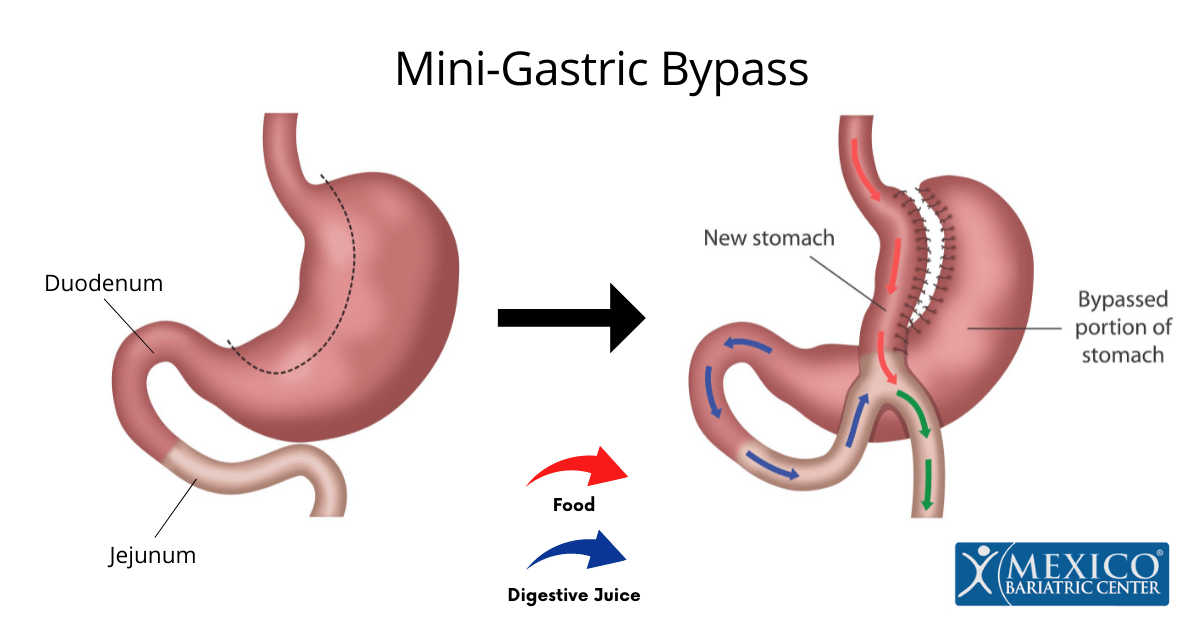
Mini bypass surgery is a procedure that can help individuals achieve effective weight loss. By redirecting food past a portion of the stomach and small intestine, this surgery limits the amount of food a person can consume and absorb. This article will provide an overview of mini bypass surgery, explaining how it works and why it can be an effective option for those struggling with obesity. By gaining a better understanding of this surgical procedure, individuals can make an informed decision about whether it is the right choice for their weight loss journey.
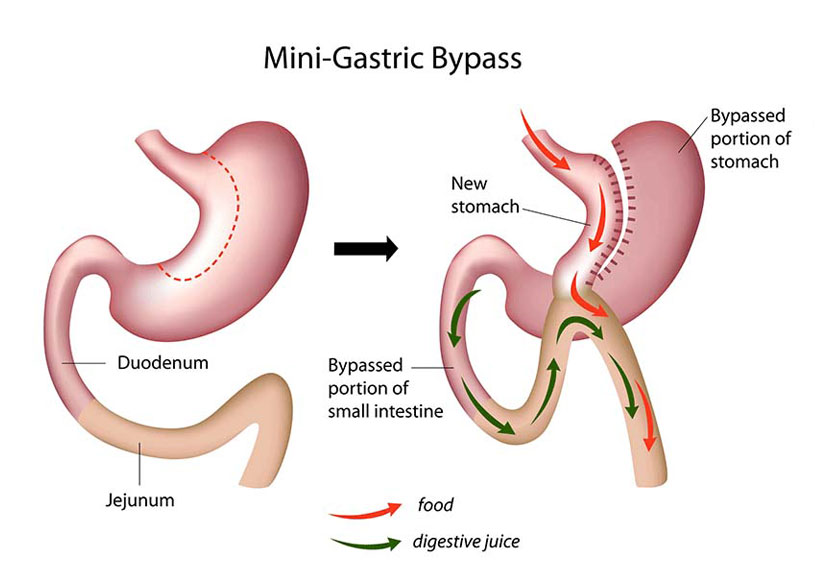
This image is property of www.obesitycoverage.com.
Scientists Discover A Hidden Root Cause Of Stubborn Belly Fat, And It Will Surprise You…
What is Mini Bypass Surgery?
Definition
Mini bypass surgery, also known as mini-gastric bypass surgery or single-anastomosis gastric bypass, is a minimally invasive surgical procedure aimed at helping individuals with severe obesity lose weight. This procedure involves rearranging the digestive system to create a smaller stomach pouch and bypassing a portion of the small intestine, leading to reduced food intake and nutrient absorption.
Procedure
During mini bypass surgery, the surgeon creates a small stomach pouch by dividing the stomach using surgical staples, or alternatively, by using a laparoscopic approach. This pouch reduces the amount of food the individual can consume at one time. Then, a loop of the small intestine is connected to the newly created stomach pouch, bypassing a portion of the small intestine where nutrient absorption takes place. This rerouting of the digestive system limits both the amount of food that can be consumed and the absorption of calories and nutrients.
Comparison with other weight loss surgeries
Mini bypass surgery is similar to other weight loss surgeries, such as gastric bypass and sleeve gastrectomy, in that it aims to help individuals achieve significant and sustainable weight loss. However, unlike traditional gastric bypass surgery, mini bypass surgery involves a simpler surgical technique and requires fewer incisions. Additionally, mini bypass surgery is generally reversible and carries a lower risk of complications compared to other weight loss procedures. However, it’s important to consult with a medical professional to determine the most suitable weight loss surgery based on individual health and goals.
Benefits of Mini Bypass Surgery
Effective weight loss
Mini bypass surgery has been proven to be an effective weight loss solution for individuals struggling with severe obesity. Many patients experience significant weight loss within the first year following the procedure, with ongoing weight reduction in the following years. This surgery provides a tool to kickstart the weight loss journey and helps individuals achieve their weight loss goals.
Reduces co-morbidities
Mini bypass surgery not only helps with weight loss but also has positive effects on various obesity-related co-morbidities. Studies have shown that mini bypass surgery can have a significant impact on conditions such as type 2 diabetes, high blood pressure, sleep apnea, and joint pain. By achieving weight loss through mini bypass surgery, individuals may experience improvements in these health conditions, leading to an overall improvement in their quality of life.
Improves quality of life
One of the major benefits of mini bypass surgery is the improvement in the overall quality of life for individuals who undergo the procedure. Beyond the physical changes, such as weight loss and reduced co-morbidities, many patients report increased energy levels, improved mood, and enhanced self-esteem. The ability to engage in physical activities that were once difficult or impossible can greatly enhance a person’s quality of life and overall well-being.
Shorter recovery time
Compared to traditional gastric bypass surgery or other weight loss procedures, mini bypass surgery generally involves a shorter recovery time. The minimally invasive nature of the surgery allows for smaller incisions, resulting in less post-operative pain and a reduced risk of complications. This means that individuals can typically resume their normal activities and work relatively quickly, allowing for a smoother transition to their new, healthier lifestyle.
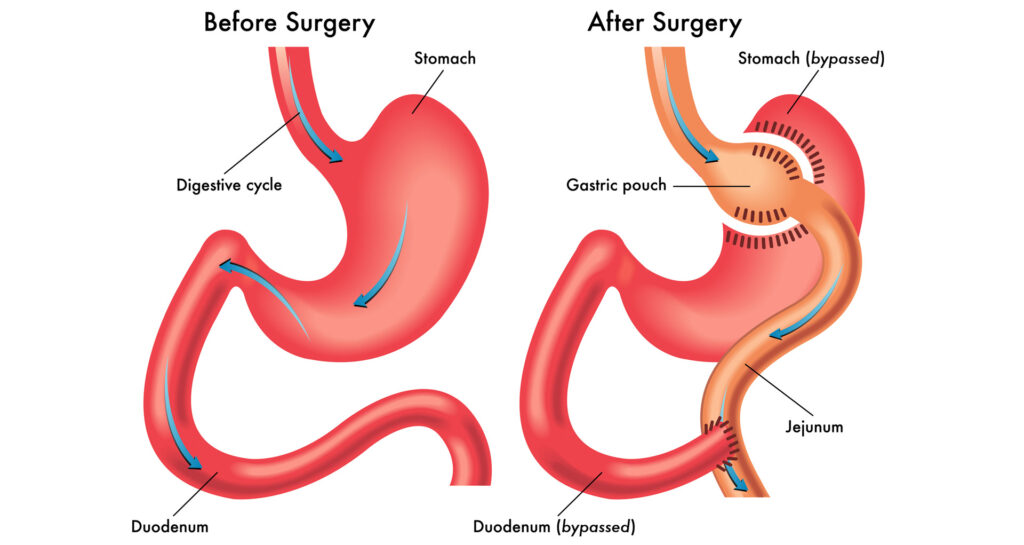
This image is property of winnettspecialistgroup.com.au.
The Secret For Healthy Weight Loss…Click Here…
Eligibility for Mini Bypass Surgery
BMI criteria
Mini bypass surgery is typically recommended for individuals with a body mass index (BMI) of 40 or higher, or a BMI of 35 or higher in combination with obesity-related co-morbidities. BMI is a measure of body fat based on height and weight. It is important to note that eligibility for mini bypass surgery is determined on an individual basis, taking into consideration various factors such as overall health and previous weight loss attempts.
Failed attempts at other weight loss methods
Individuals who have tried and failed to lose weight through conventional methods, such as dieting and exercise, may be considered eligible for mini bypass surgery. It is important to have a comprehensive evaluation by a healthcare professional to assess the reasons for previous weight loss failures and determine if mini bypass surgery is a suitable option.
Physical and psychological assessment
Before undergoing mini bypass surgery, individuals will undergo a thorough physical and psychological assessment. This assessment aims to ensure that they are physically healthy enough to undergo the surgery and mentally prepared for the lifestyle changes that come with it. The assessment may include blood tests, imaging studies, and consultations with various specialists, such as a nutritionist and a psychologist.
Managing expectations
Managing expectations is an essential part of the eligibility process for mini bypass surgery. It is important for individuals to have a realistic understanding of the potential outcomes and challenges that come with the procedure. This includes understanding the expected weight loss, the need for lifelong dietary and lifestyle changes, as well as the potential risks and complications associated with the surgery. Open and honest communication with the healthcare team is crucial to ensure that expectations are aligned and that individuals are fully prepared for the journey ahead.
Preparation for Mini Bypass Surgery
Medical evaluations
Before mini bypass surgery, individuals will undergo a series of medical evaluations to ensure that they are in optimal health for surgery. These evaluations typically include blood tests, imaging studies (such as X-rays and ultrasounds), and consultations with various healthcare professionals. The purpose of these evaluations is to identify any underlying health conditions that may affect the surgical outcome and to develop an individualized surgical plan.
Nutritional counseling
Nutritional counseling plays a vital role in the preparation for mini bypass surgery. The healthcare team, including a registered dietitian, will provide guidance on pre-operative dietary changes, as well as post-operative dietary guidelines. This counseling aims to educate individuals about the importance of nutrition in achieving and maintaining weight loss, as well as to help them develop healthy eating habits that can be sustained in the long term.
Lifestyle modifications
In preparation for mini bypass surgery, individuals may be advised to make certain lifestyle modifications. This may include incorporating regular physical activity into their daily routine, quitting smoking if applicable, and reducing alcohol consumption. These lifestyle changes are important for optimizing the surgical outcome and promoting overall health and well-being.
Mental and emotional preparation
Preparing mentally and emotionally for mini bypass surgery is crucial for a successful outcome. The decision to undergo weight loss surgery can be life-changing and may involve significant adjustments to one’s lifestyle and relationships. It is important to address any emotional concerns or psychological issues before the surgery through therapy, support groups, or other resources. Building a strong support network of family, friends, and healthcare professionals can also provide valuable support during the pre-operative and post-operative journey.
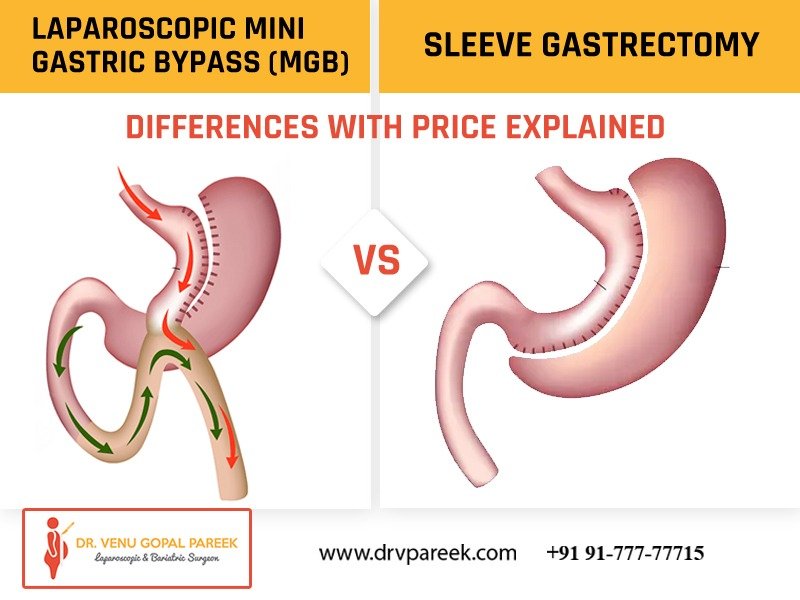
This image is property of bariatricsurgeonindia.com.
Understanding the Mini Bypass Surgery Procedure
Overview of the surgery
Mini bypass surgery involves two main steps: creating a smaller stomach pouch and rerouting the intestine. The surgeon begins by dividing the stomach using surgical staples or a laparoscopic approach, creating a pouch that is approximately one ounce in size. Then, a loop of the small intestine is connected to the pouch, bypassing a portion of the digestive tract. This limits the amount of food that can be consumed and the absorption of calories and nutrients.
Restructuring the digestive system
The restructuring of the digestive system is the key mechanism behind mini bypass surgery. By creating a smaller stomach pouch, the procedure restricts the amount of food that can be consumed at one time. This leads to a feeling of fullness with smaller portions, promoting weight loss. Additionally, rerouting a portion of the small intestine reduces the absorption of calories and nutrients, further contributing to weight loss.
Operating techniques
Mini bypass surgery can be performed using various operating techniques, including laparoscopic or robotic-assisted approaches. These techniques involve making several small incisions in the abdomen, through which the surgeon inserts a laparoscope and surgical instruments. Laparoscopic and robotic-assisted techniques offer the advantages of less pain, smaller scars, and quicker recovery compared to traditional open surgery.
Surgical risks and complications
As with any surgical procedure, mini bypass surgery carries certain risks and potential complications. These can include infection, bleeding, blood clots, leaks from the surgical connections, and complications related to anesthesia. It is important to discuss these risks with the healthcare team, ask any questions, and understand the measures that will be taken to mitigate these risks. Following the post-operative guidelines and attending regular follow-up appointments can also help ensure a smooth recovery and minimize potential complications.
Post-Surgery Recovery and Care
Hospital stay
After mini bypass surgery, individuals typically remain in the hospital for one to three days for close monitoring and proper care. During this time, the healthcare team will assess pain levels, administer medication as needed, and closely monitor for any signs of complications. This also provides an opportunity for individuals to learn about dietary and lifestyle changes, as well as receive guidance on pain management, wound care, and post-operative instructions.
Dietary guidelines
Following mini bypass surgery, a gradual transition to a new way of eating is necessary. Initially, individuals will be on a liquid-only diet for a brief period to allow the stomach to heal. Then, they will progress to a pureed and soft diet before gradually introducing solid foods. Portion control, mindful eating, and proper hydration are emphasized post-surgery to maximize weight loss and minimize discomfort. Regular follow-up appointments with a registered dietitian are crucial for ongoing nutritional guidance and support.
Physical activity recommendations
Physical activity plays a crucial role in the recovery and long-term success of mini bypass surgery. In the initial stages, individuals are encouraged to start with light activities, such as walking, and gradually increase their levels of physical activity. Regular exercise not only helps with weight loss but also improves cardiovascular health, builds muscle strength, and enhances overall well-being. It is important to consult with the healthcare team for personalized physical activity recommendations based on individual abilities and health conditions.
Monitoring and follow-up appointments
Regular monitoring and follow-up appointments are essential after mini bypass surgery. These appointments provide an opportunity for the healthcare team to assess weight loss progress, monitor nutritional status, and address any concerns or questions. Additionally, follow-up appointments allow for adjustments in medication dosages, if necessary, and provide ongoing support to ensure the individual’s long-term success.
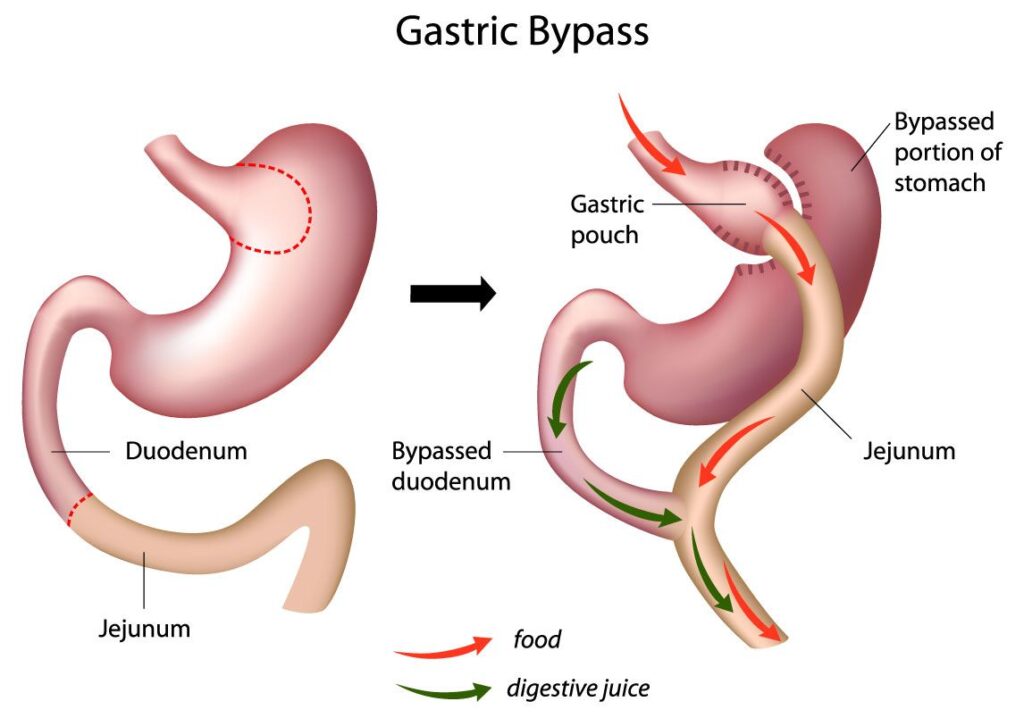
This image is property of d3b3by4navws1f.cloudfront.net.
Expected Weight Loss and Maintenance
Weight loss expectations
Individual weight loss following mini bypass surgery can vary depending on factors such as initial weight, age, and adherence to post-operative guidelines. Generally, individuals can expect to lose a significant amount of weight within the first year, with ongoing weight reduction in the following years. On average, patients can expect to lose approximately 60% to 80% of their excess body weight within two years of the surgery.
Factors influencing weight loss
Several factors can influence weight loss following mini bypass surgery. Adherence to dietary and lifestyle changes, including portion control, balanced nutrition, and regular physical activity, is crucial for maximizing weight loss. Additionally, individual metabolism, genetic factors, and overall health can also play a role. It is essential to have realistic expectations and focus on long-term success rather than immediate results.
Long-term diet and lifestyle changes
Mini bypass surgery requires significant changes in dietary and lifestyle habits to achieve and maintain weight loss. This includes adopting a nutrient-rich, balanced diet, incorporating regular physical activity into daily routines, and developing healthy coping mechanisms for emotional eating. Long-term success depends on ongoing commitment and adherence to these changes. Regular follow-up appointments with a registered dietitian and participation in support groups can provide valuable resources and guidance.
Managing weight regain
Weight regain can occur following any type of weight loss surgery, including mini bypass surgery. It is important to remember that weight loss surgery is just a tool and not a guaranteed solution. To manage weight regain, individuals should focus on recommitting to healthy habits, seeking support from healthcare providers and support groups, and addressing any underlying emotional and psychological factors that may contribute to the regain. It is crucial to remember that any setbacks can be overcome with determination, support, and a willingness to make lasting lifestyle changes.
Potential Risks and Complications
Surgical risks
As with any surgical procedure, mini bypass surgery carries inherent risks. These can include infection, bleeding, blood clots, leaks, strictures (narrowing of the passage), ulcers, and hernias. While these risks are relatively low, it is important to be aware of them and follow pre-operative and post-operative guidelines to minimize the likelihood of complications. Regular follow-up appointments with the healthcare team are crucial for monitoring and addressing these potential risks.
Nutritional deficiencies
Mini bypass surgery can potentially lead to nutritional deficiencies if dietary and supplement guidelines are not followed. The alteration of the digestive system can limit the absorption of certain nutrients, including vitamins and minerals. As a result, individuals are typically advised to take prescribed nutritional supplements, such as multivitamins, calcium, vitamin D, and vitamin B12, to prevent deficiencies. Regular monitoring of nutritional levels and ongoing nutritional counseling are key in preventing and managing potential deficiencies.
Dumping syndrome
Dumping syndrome is a potential complication that can occur after mini bypass surgery. It happens when food moves too quickly from the stomach to the small intestine, leading to symptoms such as nausea, vomiting, diarrhea, abdominal pain, and weakness. Dumping syndrome is typically triggered by consuming high-sugar or high-fat foods. To prevent or manage dumping syndrome, individuals are advised to avoid these types of foods and eat small, frequent meals focusing on lean protein, fiber-rich foods, and healthy fats.
Gallstones
Gallstones are another potential complication that can occur after mini bypass surgery. The rapid weight loss experienced after the surgery can increase the risk of gallstone formation. Gallstones can lead to symptoms such as severe abdominal pain, nausea, and vomiting. To reduce the risk of gallstones, individuals may be prescribed medications to prevent their formation, or in some cases, a simultaneous gallbladder removal procedure may be recommended. It is important to discuss the risks and potential interventions with the healthcare team.
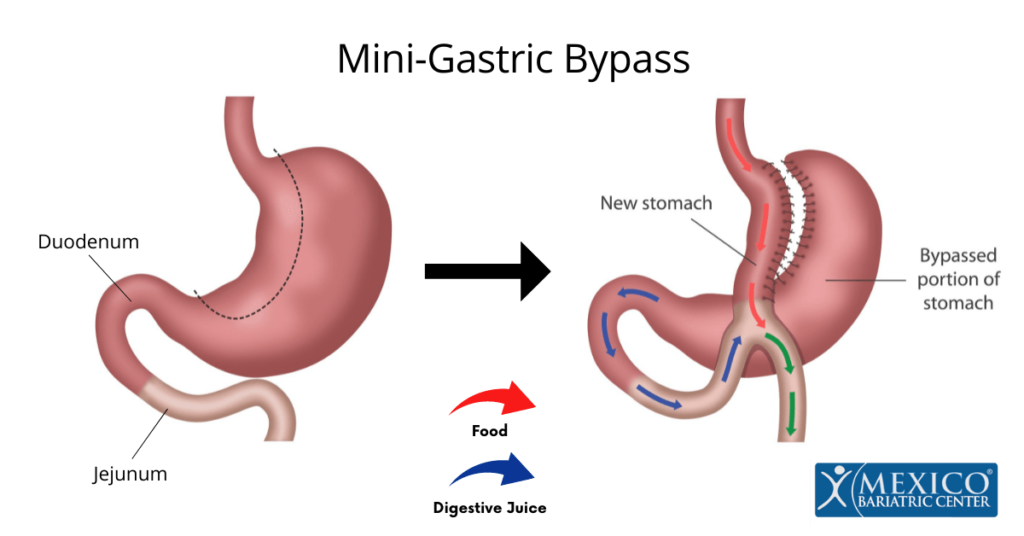
This image is property of mexicobariatriccenter.com.
Mini Bypass Surgery vs. Other Weight Loss Surgeries
Gastric Bypass
Mini bypass surgery shares similarities with traditional gastric bypass surgery, as both procedures involve the creation of a smaller stomach pouch and bypassing a portion of the small intestine. However, mini bypass surgery is generally considered less invasive and has a shorter operating time compared to gastric bypass surgery. Additionally, mini bypass surgery is potentially reversible, while gastric bypass surgery is typically irreversible. The choice between the two surgeries depends on individual factors, such as overall health, surgical risks, and personal preferences.
Sleeve Gastrectomy
Sleeve gastrectomy is another weight loss surgical procedure that involves removing a portion of the stomach to create a smaller, banana-shaped stomach pouch. Unlike mini bypass surgery, sleeve gastrectomy does not involve rerouting the intestines. While both procedures can lead to significant weight loss, mini bypass surgery often results in more rapid weight loss in the initial period. The decision between mini bypass surgery and sleeve gastrectomy depends on individual factors, such as BMI, overall health, and preferences.
Mini vs. full bypass surgery
The main difference between mini bypass surgery and traditional gastric bypass surgery lies in the length of the rerouted intestines. In mini bypass surgery, a shorter portion of the intestine is bypassed, which is believed to lead to fewer complications and an easier reversal if needed. However, traditional gastric bypass surgery has a longer track record and may be recommended for individuals with certain health conditions or higher BMIs. An individual’s eligibility for each procedure should be discussed with the healthcare team to determine the most suitable option.
Pros and cons of each procedure
Each weight loss surgery, including mini bypass surgery, gastric bypass, and sleeve gastrectomy, has its own set of pros and cons. Mini bypass surgery is generally less invasive, potentially reversible, and associated with a shorter recovery time compared to other procedures. On the other hand, gastric bypass surgery has a longer track record and may be recommended for individuals with certain health conditions. Sleeve gastrectomy does not involve rerouting the intestine, making it a slightly less complex procedure. It is important to discuss the benefits and drawbacks of each surgery with the healthcare team to make an informed decision.
Success Stories and Patient Experiences
Real-life experiences
Many individuals who have undergone mini bypass surgery have experienced significant weight loss and improved health outcomes. Real-life experiences often highlight the transformative impact of the surgery on individuals’ lives. These success stories can provide inspiration and motivation for those considering mini bypass surgery as a weight loss option. It is essential to approach these stories with the understanding that individual experiences may vary and that ongoing commitment to dietary and lifestyle changes is crucial for long-term success.
Challenges and triumphs
While mini bypass surgery can yield positive outcomes, it is not without its challenges. Individuals may face physical, emotional, and psychological hurdles along their weight loss journey. These challenges can include adjusting to a new way of eating, overcoming food cravings, managing emotional eating, and coping with body image changes. However, with determination, support, and a focus on long-term goals, individuals often experience triumphs and achieve significant improvements in their overall well-being.
Lifestyle changes after surgery
Mini bypass surgery requires individuals to make significant lifestyle changes to support their weight loss goals. This typically involves adopting a nutrient-dense, balanced diet, incorporating regular physical activity, practicing portion control, and developing healthy coping mechanisms for emotional eating. These lifestyle changes are essential for long-term weight maintenance and overall health. While the adjustments may initially be challenging, many individuals find that the positive changes lead to a more fulfilling and healthful lifestyle.
Support networks
Building a strong support network is crucial for individuals considering mini bypass surgery. This network can include family, friends, healthcare professionals, and support groups. Support networks provide emotional support, guidance, and understanding as individuals navigate the challenges and triumphs of their weight loss journey. They offer opportunities to share experiences, seek advice, and connect with individuals who are going through similar experiences. Engaging in support groups and attending regular follow-up appointments can greatly enhance the post-operative experience and long-term success.
In conclusion, mini bypass surgery is a viable option for individuals struggling with severe obesity who have not found success with conventional weight loss methods. This surgical procedure offers effective weight loss, reduction in co-morbidities, and an improved quality of life. Eligibility for mini bypass surgery is determined based on factors such as BMI, previous weight loss attempts, and physical and psychological assessments. Preparing for mini bypass surgery involves medical evaluations, nutritional counseling, lifestyle modifications, and mental and emotional preparation. Understanding the surgical procedure, post-surgery recovery and care, expected weight loss and maintenance, potential risks and complications, and a comparison with other weight loss surgeries is essential for individuals considering mini bypass surgery. Real-life success stories and the importance of support networks provide valuable insights and inspiration for those embarking on the weight loss journey. With proper preparation, support, and commitment to lifelong changes, mini bypass surgery can be a life-changing solution for effective weight loss and improved overall health.
The Most Potent, Fast-Acting Formula For Incinerating Stubborn Fat
